Alberto Vàzquez is a Spanish filmmaker and comic book artist who is currently releasing their second animation feature film Unicorn Wars – this Spanish and French co-production, released in October in Spain, will release on December 28th in France and 2023 in the USA.
Director Vàzquez makes very particular propositions in their movies. Very cute, innocent designs, reminiscing of children’s cartoons but addressing serious themes, like war or substance abuse, and does not hesitate to get violent and graphic.
I first encountered the works of Alberto Vàzquez during the first Annecy International Animation Film Festival I attended in 2016. At that time, Psiconautas, los niños olvidados (released internationally as Birdboy: The Forgotten Children) was in competition. I was deeply moved by that movie. Its very down-to-earth depiction of love and how these characters were living in this polluted, toxic environment stuck with me.
One year later, still at Annecy, I had the opportunity to meet the co-director of the movie Mr. Pedro Rivera, who was protesting alongside Taiwanese filmmakers against the festival’s decision to submit to Chinese pressures and have Taiwanese films in competition labeled as being from “Chinese Taipei.” (A decision they reverted following the protest)
This year we had the opportunity to attend, at Annecy once more, the world premiere of Alberto Vàzquez’s latest movie Unicorn Wars, which doubles down on the proposition made by Birdboy with a very raw, violent, but honest war movie. A film that impressed us not only for the way it addresses its themes but also through its beauty on screen.
I couldn’t have been happier when the cinema Le Forum des Images in Paris offered us the opportunity to meet and have an exclusive interview with Alberto Vàzquez, who has been invited as guest of honor to their animation festival Le Carrefour du Cinéma d’Animation, which takes place this year from December 9th to December 15th.
Our content is only possible through your help! Support us on Ko-Fi!
In 2007 you published your graphic novel Psiconautas, and four years later, you released your first animated short films, Judas the Catholic Squirrel, which is part of an anthology, and Birdboy, which is an adaptation of your novel. What led you to make animation?
Alberto Vàzquez: Well, what led me towards it was the opportunity to transform Psiconautas into a short film. There was this producer who read Psiconautas, and he liked it very much – he is Pedro Rivera, and he is also the co-director of that movie. We decided to make a short film out of it because we knew that turning it into a feature-length movie would be too difficult. An animated film for adults, which is dark here in Spain, would be too risky, so if we didn’t get the amount needed for it, at least we could make a short film. The short film was quite successful; it won some awards, such as the Goya Award. Around 2013 or 2014, we received funding to make a feature-length movie out of it. It was a relatively small budget, less than a million euros. We took this opportunity to expand on the themes and characters from the comic. It was a dream that came true. I feel at ease making animated movies because it’s at a crossroads between my greatest passions: comics and cinema. But I also think that animation has its own grammar to express itself. I fell in love with this world that allows me to share my stories audiovisually. I hope that I can keep doing so for many years to come.
You just talked about Mr. Pedro Rivera. Is there any particular reason he didn’t take part in Unicorn Wars despite working tightly together to make the Unicorn Blood short film that inspired the feature film?
Alberto Vàzquez: Pedro Rivera worked with me as a co-author on Unicorn Blood. I guess it’s simply because we had this working relationship while working on Psiconautas, but he moved on to his work as a producer and writer after that, and I followed my own path as a director and writer. When working in animation, it happens a lot, you work with certain teams at certain times, and it changes. Some animators who worked on Psiconautas stayed, and others left. I myself am working with other producers now. These changes are a natural aspect of the industry, and each project is quite different.
Psiconautas, as well as Unicorn Wars, are movies that address very serious, adult, and even controversial topics while having characters with very innocent designs. They look like characters one could find in a cartoon destined for children. What are the intentions behind such a contrast between the substance and the form?
Alberto Vàzquez: Well, there are two intentions. The first one is to play with these figures and icons from our childhoods which are universal ones. When watching Unicorn Wars, you can’t really tell if it’s French, Japanese, American, or Spanish. Wherever you are from, you know what teddy bears and unicorns are. What I find interesting is how they allow me to provoke. But provoke in a good way, trying to make the spectators feel something. There is some interest in seeing these icons suffering and going beyond their childhood preconceptions that they are naive cute characters. I want to show what they have in their guts and what emotions they feel. And just like humans, they aren’t necessarily very noble ones. I think it’s a great way to talk to kids and adolescents as adults. Not using a paternalistic tone, but talking to them as a big brother would do.
At the same time, adults who come to watch the movie feel nostalgic, allowing them to rediscover these childhood figures, but through a different perspective, a more grown-up one this time.
These are the two goals: nostalgia and provocation, as well as subverting these childhood icons. Show them in a way they have never been shown before. I mean, I’m not the only one using these animals; they are universal. They do not belong to me or to anyone in particular.
Unicorn Wars is a movie that received more means than Birdboy: The Forgotten Children. It’s a co-production with two animation studios in France, larger teams. How did you handle this international production, especially since it took place during the pandemic?
Alberto Vàzquez: It’s true that Unicorn Wars did receive more means than Birdboy: The Forgotten Children, but we’re still talking about limited budgets for producing animation films. In Spain, there is a cap on the funding for such projects. If one wants to make a more ambitious project, there is no other choice but to co-produce. In this case, we worked with Autour de Minuit, with which I worked on my short films Decorado and Homeless Home. As you said, the production happened in the middle of the pandemic. Four studios working remotely meant a lot of online meetings, meetings with the masks, and the curfews didn’t help too. It did add complications. We relied heavily on Autour de Minuit because they were well-experienced with 3D. For the movie, that means it’s everything relating to the unicorns. In France, they focused more on the 3D aspects of the film, whereas in Spain, we worked more on the 2D ones. But everyone worked on a bit of everything. We worked with an Open Source software called Blender. It was work intensive, difficult, and slow, as it often is while making animated movies. But we were able to hit the deadlines, and we’re happy about the result.
I was just about to ask you about the use of 3D CGI for the unicorns. It’s used in such a stylized way that one wouldn’t even notice it’s 3D. What was the thought process behind it, and how did you achieve such a result that makes it, so they integrate so well with the traditional animation on screen?
Alberto Vàzquez: Well, we encountered one big problem when making this movie. There are about 25 minutes of unicorn scenes in the movie, and animating horses would have brought us way over budget. There are scenes with 15 unicorns, others 7, and others 6 with four bears; it would have gotten very difficult. So we decided to use 3D because we could draw two or three unicorns, duplicate them, and make the work easier. We used a tool called Grease Pencil, which allows animating in 2D within Blender. This way, we could do all the work within one single environment without relying on two or three different software, which would have complicated things. We made tests for the integration by animating the bears on 2s, that is 12 drawings per second, and what we did with the unicorns was the same, breaking their animation also on 2s or even 3s, 8 drawings per second, in order to make it not so fluid and link them to the teddy bears’ animation. It was also an aesthetic choice. We decided the unicorns would all be dark, nearly pitch black, with an inner light. That was done more traditionally, frame after frame, nearly hand-drawn. At the same time, it was a way to get these unicorns out of that 3D environment and give them a more mystical, magical feel, thus bringing them closer to traditional animation. So it was for budgetary reasons but also a conceptual, aesthetic choice.
A recurring theme in your movies is how you talk about ecology and humanity’s relationship to nature. One director who comes to mind a lot when discussing such themes addressed in animated movies is Hayao Miyazaki and films like Nausicäa or Princess Mononoke. What is your relationship to his works? Is he an inspiration for you?
Alberto Vàzquez: I think Miyazaki is the Padre of animation. It’s impossible denying being influenced by him. I’d say that 90% of the people working in the animation industry have been influenced by him, as he was involved in some of the best animated films in history. It’s true that the ecological theme is present in Birdboy: The Forgotten Children and Unicorn Wars. Birdboy is about how the pollution caused by the factory and the aftermath of its destruction ends up polluting the mind of the characters.
Regarding Unicorn Wars, the unicorns have this magical power that allows them to heal the forest, whereas the bears, who represent humans, destroy the forest even though it’s their paradise so that they can appropriate it for themselves. It’s a universal topic and a very current one too. I don’t see myself not talking about it. I think animation is the most poetic way of talking about reality through its use of metaphors and all kinds of visual plays. One can address current issues through this poetry. We often work with allegories, tales, and fables, so we resort to using the same tropes; it’s inevitable, like the magical forest that can be found in so many classic Disney movies.
To conclude on the question, I haven’t consciously thought about Hayao Miyazaki while making my movies, but he is already such an important part of the collective imagination of animation. So am I inspired by his works? Undoubtedly, even if it might be in more unconscious ways.
Despite being a co-production between Spain and France, I’ve heard you struggled to get funding and support on the French side. Do you think that the style of your movies scares investors and producers? Is it difficult today to bring an animated feature film such as Unicorn Wars to the big screen?
Alberto Vàzquez: I suppose it is difficult, yes. In Spain, we’ve got financing without many problems. We got the support of Galician television, Basque television, and Spanish national television. In France, we got support from none. I think it’s difficult because animation is a misunderstood part of cinema. Such a movie is a movie for adults, but not for all adults. It’s a movie for adults who like animation, who like fantasy movies, horror movies, and author movies. They are various niches in a market, but that market does exist. At a global level, there are a lot of people who will be interested in such a movie. It’s a kind of cinema that is quite fragmented. Also, there is something that directors can’t control, and it’s that probably 95% of animated movies are made for children or teens. It’s hard to go beyond that as if animation couldn’t target adults. But I guess directors working on arthouse movies or documentaries encounter similar hurdles. It’s a more difficult path to get financing, but I think we made a movie that can still reach a broad audience, even if it will take more time. The movie might be unsettling in its aesthetic, but it has a very easy-to-follow story with universal themes. It’s not an experimental movie; it holds the spectators by the hand and tries to provoke emotions. I think it might become a cult movie over time, but it won’t be a box-office hit, but I can’t control that. I just make the movies I’d like to watch.
That’s what happened with Birdboy: The Forgotten Children, which was praised by critics but performed poorly in theaters and then gained a reputation over time as it was released in more countries.
Alberto Vàzquez: Yes, it’s kind of like that. I can’t do much about it. My cinema makes a proposition. Birdboy was a movie about love, and Unicorn Wars is a movie about hate. It’s a very violent, aggressive movie. I make the movies I’d like to watch; that’s how I work. I’m interested in having my own vision. When I watch movies, I look for movies and directors who have their own visions. I want to work on the topics that matter to me, using metaphors. If I can’t do it through animated feature films, I’ll do it through short films, if that fails, I’ll make a comic book, and if that doesn’t work, I’ll write a book. But what’s important to me is to offer my own point of view and make my own proposition to the spectators. That’s the way I want to keep working.
I think we’re already past the allocated time, but if you don’t mind us asking one last question. Another big theme in your movies is the place of religion in society. Be it the criticism of religious fundamentalism in Birdboy represented by Dinky’s parents or how religion can be used as a totalitarian tool to control society in Unicorn Wars. But it’s not just critical. There is also an exploration of biblical precepts about Human nature, about the origins of evil. I’m very interested in knowing: what is your relationship to religion and God?
Alberto Vàzquez: I have a love-hate relationship with religion. On the one hand, I am fascinated by religious and medieval arts. I also love the spirituality that can be found in faith. And I am not talking about the church in this case, but the good religion can bring to the faithful. On the other hand, it’s a tool of mind control, and it’s a castrating environment. That’s how I have depicted it in the movie. Bears are the dominant species; they live in a religious and military society. They see the unicorns as demons they need to exterminate. It’s a tale as old as the world. They control public opinion through their sacred text, their prophecy. I think that when there is a religious component, a religious ideology behind wars, they are even more destructive and terrible.
About the catholic religion, more precisely, which I know well as I am Spanish, what I am interested in are the concepts of the sense of culpability, the question of the origin of evil, these fratricidal wars in the Bible such as Cain and Abel, just like the two bear brothers in Unicorn Wars.
I want to talk about it because I have bathed in it since I was a child. I wanted to portray it like a medieval codex.
In Spain, we have a relationship with religion that is very present and very strong. I can’t imagine Spain becoming a laical country ever. I myself have studied in a religious school, with priests as our teachers—the bear priest in the movie talks just like a teacher I had at the time.
I’d say that my relationship with religion is simultaneously a relationship of love, humor, and hate.
We wish to share our heartfelt gratitude with Mr. Alberto Vàzquez for his time, as well as Diana-Odile Lestage from the Forum des Images, and Aurélie Lebrun and Emanuelle Verniquet from Games of Com for making this interview possible.
Like our content? Feel free to support us on Ko-Fi!
You might also be interested in
Oshi no Ko & (Mis)Communication – Short Interview with Aka Akasaka and Mengo Yokoyari
The Oshi no Ko manga, which recently ended its publication, was created through the association of two successful authors, Aka Akasaka, mangaka of the hit love comedy Kaguya-sama: Love Is War, and Mengo Yokoyari, creator of Scum's Wish. During their visit at the...
Ideon is the Ego’s death – Yoshiyuki Tomino Interview [Niigata International Animation Film Festival 2024]
Yoshiyuki Tomino is, without any doubt, one of the most famous and important directors in anime history. Not just one of the creators of Gundam, he is an incredibly prolific creator whose work impacted both robot anime and science-fiction in general. It was during...
“Film festivals are about meetings and discoveries” – Interview with Tarô Maki, Niigata International Animation Film Festival General Producer
As the representative director of planning company Genco, Tarô Maki has been a major figure in the Japanese animation industry for decades. This is due in no part to his role as a producer on some of anime’s greatest successes, notably in the theaters, with films...
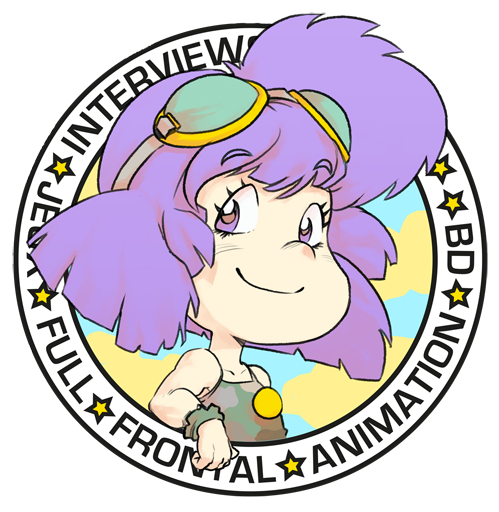
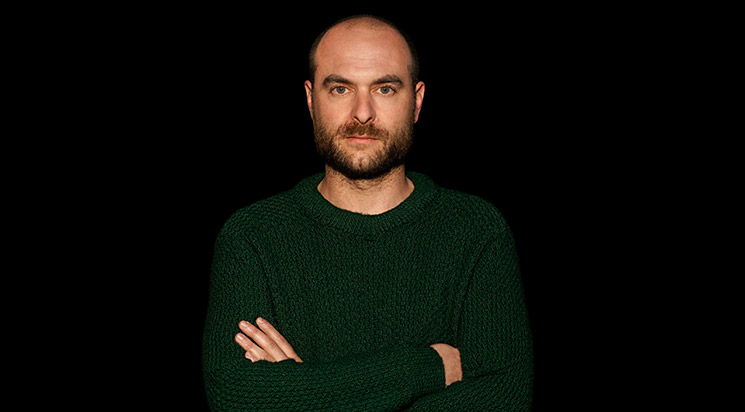
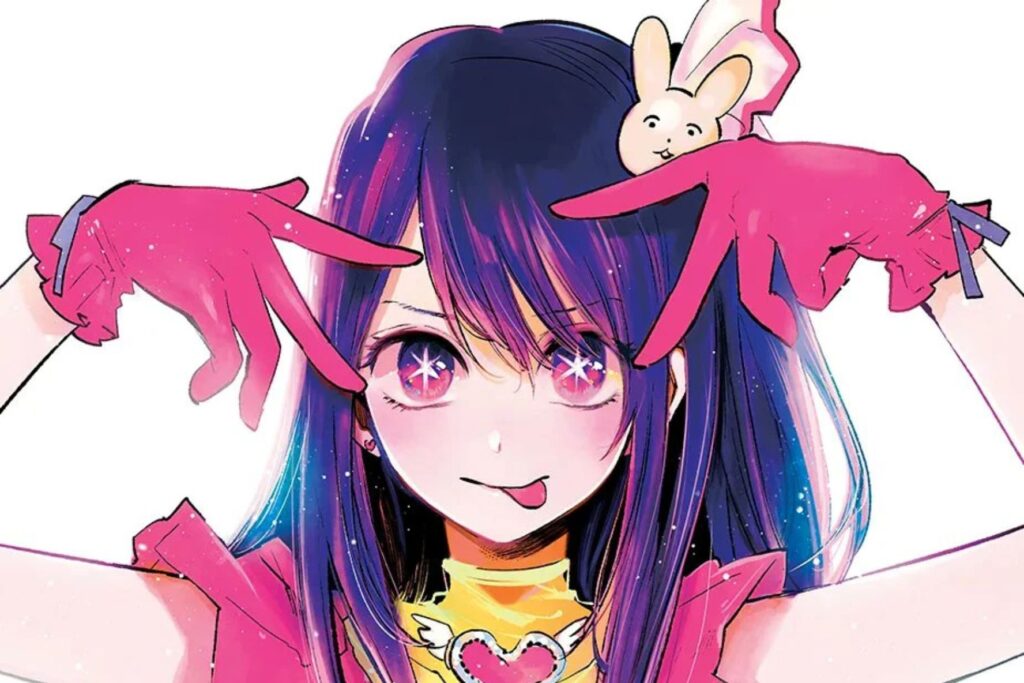
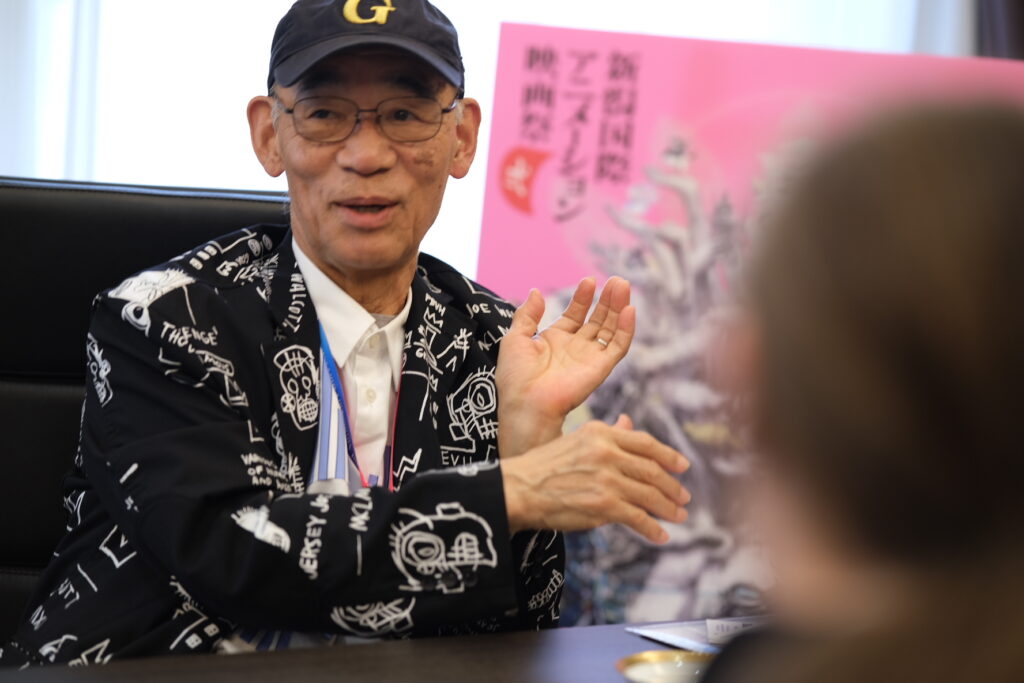
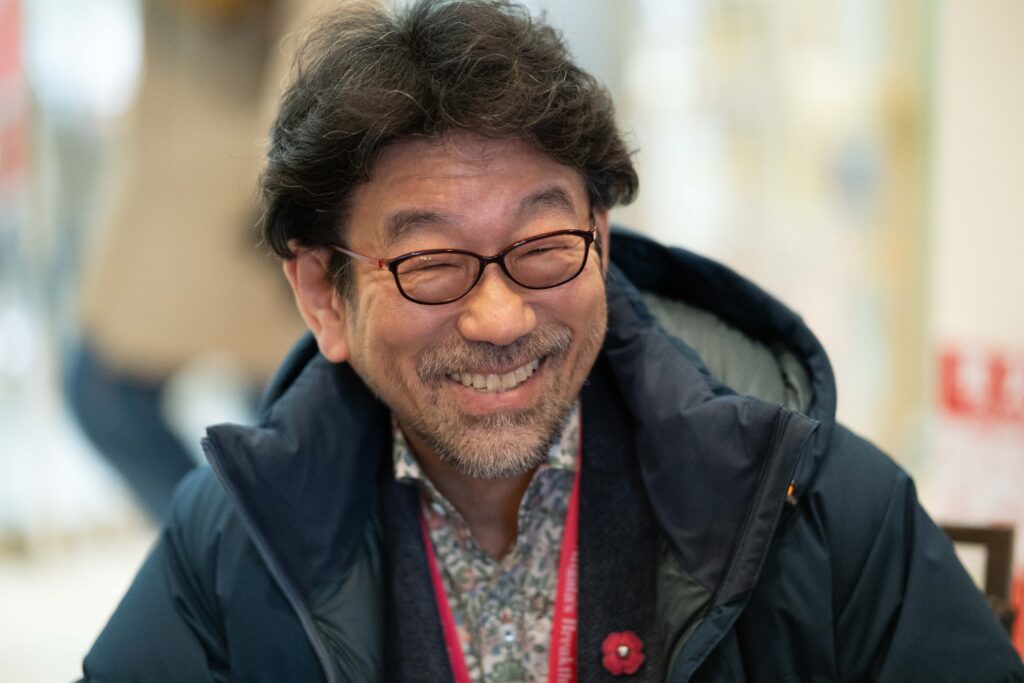
Recent Comments